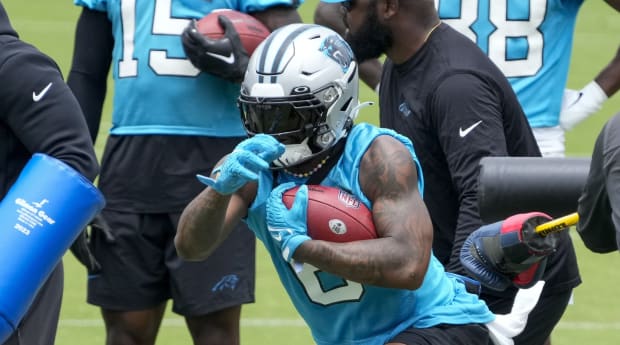The running back position has received a lot of attention this week, as studs like Saquon Barkley and Josh Jacobs failed to come to terms on contract extensions with their respective teams over their salaries. One runner who did get paid in the offseason is Miles Sanders, who inked a four-year, $25.4 million contract with the Panthers. He’ll make just over $6 million a year, on average.
Sanders, who’s entering his age-26 season, is coming off a “successful” campaign in which he finished 15th in fantasy points at his position. He was a few spots lower on a points per game basis, though, ranking 21st among backs who played in at least 10 games. Now in Carolina, he’s the 20th runner off the board on average in both the NFFC and Underdog best ball leagues during the month of July.
The question is, will Sanders be worth it?

Jim Dedmon/USA Today Sports
Before we can answer that, let’s look deeper into his numbers during last season and in his tenure with the Eagles. In his first two years in the NFL, Sanders averaged 13.7 points and 14.2 points per game. He’s been 15th at the position twice, once during his rookie season and again last season.
That doesn’t seem too bad on the surface, but let’s peel back the onion a bit more. In 2022, Sanders scored almost 50% of his points in four games. Furthermore, he was held to single digits eight times (47%) and scored fewer than 6.2 points in each of his last four games of the regular season. That wasn’t just a last year thing, either.
In fact, Sanders has been wildly inconsistent throughout his career.
In 57 regular-season games, Sanders has scored 10 or fewer PPR points 27 times. So, he’s been a below average fantasy scorer in roughly 50% of his games. He’s been held to fewer than 15 points 40 times (72%), and he’s scored over 20 points just 10 times (18%). Simply put, Sanders is a tough back to trust.
By comparison, the aforementioned Jacobs (drafted in the same year as Sanders) has scored fewer than 10 PPR points just 10 times (23%) in his 60 regular-season games. He’s been held to 15 or fewer just 55% of the time, and Jacobs has scored more than 15 points 27 times (45%) and over 30 points 16 times (27%).
That’s the type of production we want from our running backs.
The argument for Sanders being better in Carolina is projected volume and maybe more red-zone opportunities. After all, he lost such touches to Kenneth Gainwell, Boston Scott and his quarterback, Jalen Hurts. Sanders will only have to contend with Chuba Hubbard now, and rookie quarterback Bryce Young isn’t going to run much. Those points are valid, but what about the fact that he’s now in a far less explosive offense?
Last season, no team in the league ran fewer plays than the Panthers. Philadelphia had the fifth most. Carolina also ran the fourth-fewest plays in the red zone, while the Eagles were tied for the third most. True, the Panthers offense will be much different this season, but how much better will it be with a rookie quarterback?
Another reason to beware of Sanders is that he’s not great at creating plays. Based on the data from our friends at Fantasy Points, Sanders ranked 42nd among backs in yards after contact percentage (minimum 100 attempts). That’s awful. Basically, it means that if the offensive line didn’t open holes for him, Sanders didn’t go far.
That’s all fine and good while running behind the Eagles’ stout offensive line, which is considered the best unit in the league, but how will Sanders fare in Carolina? The Panthers’ offensive line has some potential if former first-round pick Ikem Ekwonu can make a leap in Year 2, but this unit won’t be close to the same level as Philadelphia. These are some of the reason’’s why SI Fantasy’s Bill Enright named Sanders his top bust for 2023.
All of this data makes it pretty clear. Even if Sanders sees more touches, and I doubt that will happen after he had 279 last year, he’s going to be in a far less productive offense where his red-zone touches could be limited as a result. And unless he makes a massive leap in his level of consistent production (again, I doubt it), we aren’t going to see an increase in production in his first year in Carolina.
This doesn’t mean I’m avoiding Sanders in drafts altogether. But I’m certainly not reaching for him and the headaches he has brought and will continue to bring with his new team. After four years in the league, Sanders is what he is … a decent but not great back who will drive you nuts with his level of fantasy inconsistency.







